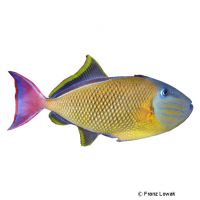Redtail Triggerfish (Xanthichthys mento)
| Redtail Triggerfish Xanthichthys mento | |
|---|---|
| Name | Redtail Triggerfish |
| Name Lat. | Xanthichthys mento |
| Family | Triggerfishes |
| Family lat. | Balistidae |
| Order | Puffers & Filefishes |
| Order lat. | Tetraodontiformes |
| Origin | Pacific |
| Habitat | Seaward reefs |
| Diet | Planktivore |
| pH | 8,1-8,4 |
| Hardness | 8-10 °KH |
| Behavior | Semi-aggressive |
| Keeping | Individual, pair, group |
| Reef Compatible | With caution |
| Care Level | Moderate |
| Life Span | N/A |
| Protection | No |
| Metric Units | |
| Size | 30 cm |
| Temperature | 18-24 °C |
| Salinity | 33-36 ‰ |
| Aquarium | ~ 750 l |
| US Units | |
| Size | 12" |
| Temperature | 64-75 °F |
| Salinity | 1.020-1.025 sg |
| Aquarium | ~ 180 gal |
Distribution and habitat
Xanthichthys mento are widely distributed in the Pacific from California to Chile and across the central Pacific to southern Japan and the Ryukyu Islands. They live mostly in loose groups on outer reefs with strong currents in 6 to 130 m water depth.
Maintenance
They require a well-structured reef aquarium (rock and stone structures) with caves, crevices and live stones that act like a biological filter, as well as sufficient swimming space, a strong current and coarse-grained sand surfaces. Only lime-rich, heavy metal-free sands, gravels, stones or sea sand may be used.
Filters, skimmers and heaters are necessary to ensure water quality, as well as pumps to simulate tides, swells and bottom currents. Lighting must be appropriate for the species' day-night rhythm
| Salinity: 33-36 ‰ | pH value: 8.1-8.4 |
| Carbonate hardness: 8-10 °KH | Nitrate content: 2-8 mg/l |
| phosphate content: 0.01-0.1 mg/l | nitrite content: 0.0-0.05 mg/l |
For salinity, an average value should be aimed for, which may only vary slightly by +/- 0.5 ‰. Ammonia and ammonium must not be measurable. Special attention must be paid to constantly good water quality.
Diet
In nature they feed mainly on zooplankton. The feed conversion is unproblematic. The diet consists of a vitamin-enriched, frozen food mix for planktivores, supplemented with algae and hard-shelled food (small shrimp, krill, mysis, etc.) to wear down their regrowing teeth. High-quality flake and granulated food is also accepted without problems
It is recommended to feed small portions several times a day. Regular and varied feeding promotes health and increases resistance.
Behaviour and compatibility
They are peaceful triggerfish that can be socialized well with other fish that are not too small. Keeping a group is only possible in a much larger, richly structured tank.
Sex dimorphism
The males have a yellowish, the females a gray-blue basic coloration.
Reproduction and breeding
There are isolated reports of successful breeding in the aquarium.
Important
Too high water temperatures are not tolerated in the long term. They can make clearly audible noises. As coral reef inhabitants they should not be kept in a fish-only aquarium. They can be kept without problems with corals and with frequent and varied feeding also with other invertebrates
Technical equipment such as heating rods and cables should be inaccessible to the triggerfish to prevent them from chewing on them
If different species are kept together, care should be taken to ensure that the fish match each other in terms of water quality and temperature requirements and social behavior, and that the setup meets the needs of all species kept together. Newly introduced fish must be acclimated slowly to the water in the aquarium.
Further literature can be found in your pet store.
References
Text: Werner Winter; Image: Franz Lowak
Source: KUITER, DEBELIUS (2007): Atlas der Meeresfische: Die Fische an den Küsten der Weltmeere, Kosmos Verlag; PATZNER & MOOSLEITNER (1999): Meerwasser Atlas Bd. 6, Mergus Verlag; ENGELMANN (2005): Zootierhaltung - Tiere in menschlicher Obhut: Fische, Verlag Harri Deutsch
- Gemäß § 21 Abs. 5 Tierschutzgesetz idgF
